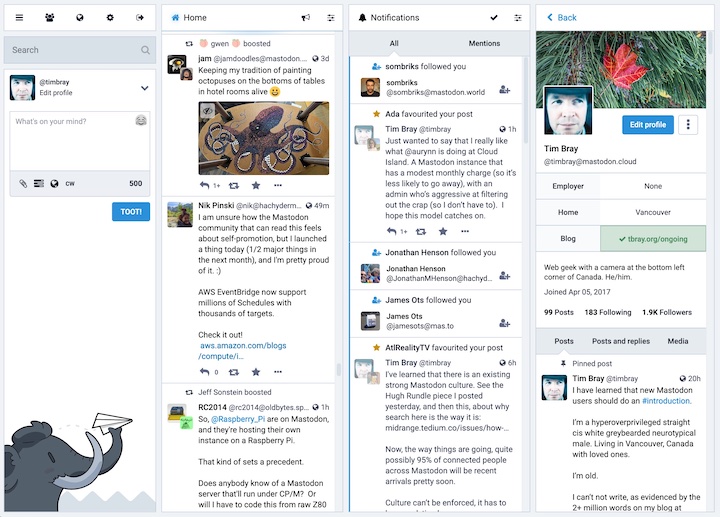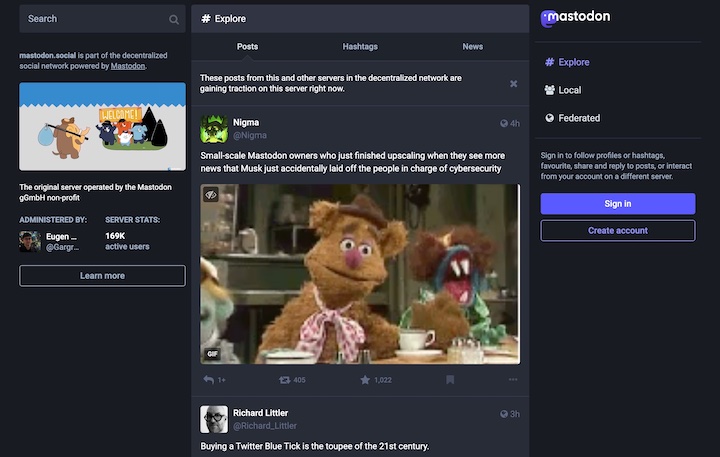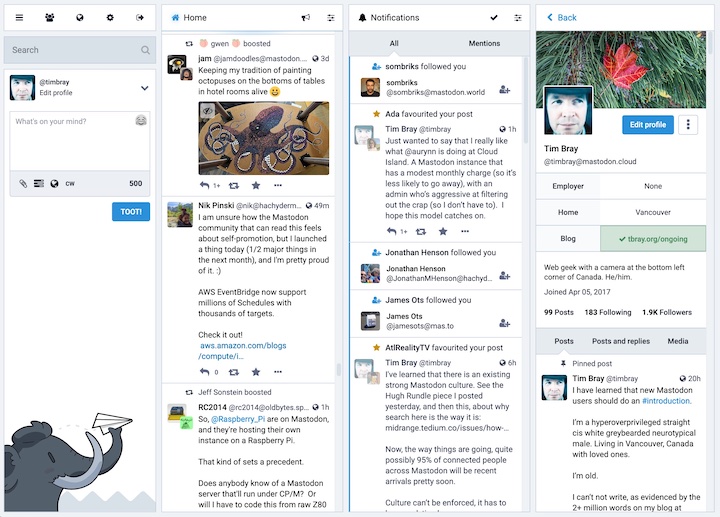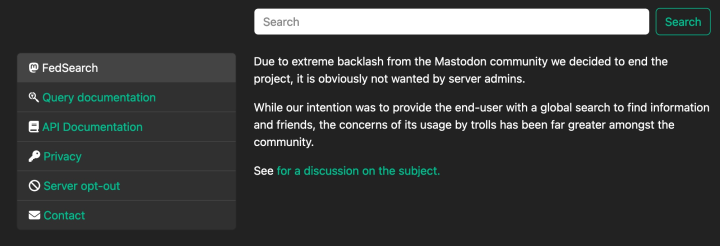
My first Mastodon post (that I can find) dates from April 6, 2017. I try to check out interesting n 2022-11-11 04:0:0 Author: www.tbray.org(查看原文) 阅读量:31 收藏
My first Mastodon post (that I can find) dates from April 6, 2017. I try to check out interesting new life-online technologies, and this was one. But I found it sort of quiet and empty and didn’t say much. Now, following on Muskification, Twitter may become an unattractive online home, so it’s time to explore alternatives. I’ve been digging deeper into Mastodon (so have really a lot of other people) and this is a progress report.
Just the facts ·
- I re-activated on Oct 28th.
I’ve posted (“tooted”, some say) 42 times.
I have 1.9K followers.
I’m following 182 other Mastodonians.
The front page at mastodon.social,
the original instance (non-logged-in version).
What it is · It’s open-source software written in Ruby on Rails with development led by Eugen Rochko. It’s built around the ActivityPub social-federation protocol.
Which means anyone can put up a Mastodon “instance”, invite people aboard, and those people can follow and message anyone from any other instance; the federation is automatic and built-in. So you have to pick an instance to get started, and that might make you nervous, but it shouldn’t because of instances’ most important feature: You can change your mind!
For example, I first signed up with mastodon.cloud and mastodon.social (I can’t remember why). I noticed that I was getting more interesting interaction on the former, so I hit the settings at .social and by pushing a button, was able to migrate my presence and all my followers over to .cloud. It worked great, except for I hadn’t got around to silencing my Mastodon notifications on my phone and there was extended dingety-dingety-dingety-ding.
Sorry, I’m going to stop there and let that sink in. Social-networking technology with lock-in engineered out.
This is the kind of system that we thought we were building the Web to support.
Picking an instance · While the instances are all running the same software (I think), each has its own admin (or admins) running the show. While some technology is involved, so far I get the feeling that running an instance is not that terribly taxing. So the central service provided by an admin is moderation. For that, you get the usual tools for admonishing and suspending and banning users, but you also get the (very powerful) defederation tool. This means that if there’s another instance that has a really lousy admin and is full of Nazis or whatever, you can just stop federating with it.
When you’re logged into Mastodon, you get your own feed and notifications that work about like Twitter’s. You also get a feed of all the posts on your instance, and an (entirely useless in my experience) “global feed”.
My current Mastodon browser display.
If you think about it, this creates two opportunities. First, instances can come with some sort of affinity: Geographical (e.g. Vancouver), cultural (e.g. birdwatching), linguistic (e.g. Basque), or, well, anything you can imagine.
Second, you can host yourself; all you need is a domain name and (for the moment) a certain amount of technical competence. There’s already a service, masto.host, that offers one-click self-hosting for a single-digit number of dollars per month. But, what with Elon’s traffic surge, they’ve shut down new subscriptions for the moment.
An instance doesn’t have to be offered for free! I already know of one, Cloud Island, in New Zealand, that charges a modest monthly subscription fee. Obviously, if Mastodon gets big, either you’re going to pay or there are going to be ads. I’d rather pay. I would have rather paid for Twitter, but I guess that’s not the way it’s going.
I think there are business opportunities here and, more important, a big opportunity for small “lifestyle” businesses; running instances for neighborhoods or small towns or hobbies or tourist destinations or whatever. I would love for there to be a class of online business that doesn’t converge inexorably to global tech titan.
Software · If you’re on a computer with a big screen, the browser interface is just fine. The default setting seems to be a TweetDeck-style thing with (by default) four separate columns for searching, your feed, your mentions, and individual threads. You can also point that last column at the global or instance feed. It works for me.
On Android, there’s an official Mastodon app in the Play store, and it’s OK. There’s another called Tusky that some say is better and it’s certainly more like Twitter, but I find neither gets in my way.
Because this is built around ActivityPub, which anyone can implement, you don’t even have to use the official Mastodon software on your instance server. There are alternatives called PixelFed, Pleroma, PeerTube, Lemmy, and Misskey. I haven’t had time to develop an opinion about any of them, except for I hear Pleroma is in Elixir, which might be a good scaling story. More on scaling below.
The culture issue · So, it turns out that in recent years, the (small) Mastodon community has developed its own pretty-strong culture. If you go there expecting it to be Just Like Twitter you’re apt to get a surprise. I found this out when I discovered that Mastodon’s search function is extremely limited: You can search for Mastodon handles, hashtags, and URLs, and that’s all.
So I posted a question wondering if there were an equivalent to Twitter’s “firehose” so someone could build an all-of-Mastodon search index. I got immediate and aggrieved pushback saying “We don’t want it and people will block you for implementing this” and “They tried at that fedisearch and look what happened” and “The entire thing that you’re doing is giving off massively creepy vibes and I suggest you just take a step back and not do anything.”
There are cultural specifics around Content Warnings and hashtags which I’m not going to try to teach since I’m just learning. But there are also plenty of getting-started guides.
OK, then. I could explain the cultural issues at length here, but instead I’ll point you at Home invasion: Mastodon's Eternal September begins at Information Flaneur. Specifically on search, there’s also Why Mastodon Search Seems So Unclear by Ernie Smith.
I respect unique online cultures. But there’s maybe a problem. If Twitter does implode, Mastodon could very quickly gain a whole bunch of new users, to the extent that long-term Mastodonians are like only 1% of the population, and the newer 99% has no appreciation of nor interest in “Mastodon culture”. The system is flexible enough that maybe there’s scope for an “og-mastodon” instance that would work in a more traditional way?
But still… Mastodon has an API, its posts have URIs, and it’s probably not technically feasible to keep someone from building a search index of the whole space, culture be damned. Now, I am 100% in sympathy with people who want to be able to type a few words into a computer that don’t become part of an immutable eternal public record.
Out in Web space, we have the Robot Exclusion Protocol, which works pretty well. I can testify, as the former operator of a couple of large-scale Web crawlers, that if you infringe on the protocol (accidentally, in my case) you will get angry interventions from people that you can’t ignore.
I believe, but
haven’t verified, that Mastodon’s existing #NoBots hashtag is supposed to mean this? Anyhow, if I were one of the
core Mastodon designers, I’d make sure this was totally clear, and get a good lawyer to create terms-of-service language so
there’d be a plausible legal challenge to anyone who tried to ignore it.
And the Mastodonians do need to be aware, as I’m sure most readers here already are, that there will be certain public-sector organizations headquartered for example in Washington DC and Beijing, that are almost certainly gathering your words even now and will-preserve them in indexed-and-searchable form for the foreseeable future.
I confess to a bit of skepticism about the whole Mastodon-culture thing, based on the testimony of a couple of my tech heroes, both of whom happen to be women of color. See Chanda Prescod-Weinstein’s thread; she’s abandoned Mastodon for the moment.
Also Timnit Gebru posted, on Mastodon, “Reading so many accounts of especially Black people being harassed on here to the point of leaving. And also the type of aversion there is to talking about it. SMH. Can’t we have anything that isn’t racist by default?” but I’m delighted that she has found a friendly instance and has made the jump: As of now her display-name on Twitter is “Timnit Gebru is on Mastodon”.
You will notice that I have deliberately not linked to the Mastodon discussions involving people who haven’t consented to such exposure. Feels weird but necessary, at least for now.
Scaling · On Nov. 6th, chief Mastodon Eugen Rochko posted “Hey, so, we've hit 1,028,362 monthly active users across the network today. 1,124 new Mastodon servers since Oct 27, and 489,003 new users. That's pretty cool.” Also pretty scary. Let’s see, a Rails-based service trying to stay on top of a global social mesh extending across not only an exponentially-growing number of users but also instances? What could go wrong?
It is already the case that while you can upload video into Mastodon, the instance admins would rather you didn’t because they don’t want to be on the hook to provide the storage.
Actually, I worry less about this than others seem to. Twitter was unreliable for years and nobody cared that much because what it offered was of value to people. I’m pretty sure that what Mastodon is trying to do can be done.
So, What’s going to happen? · Don’t be silly. Nobody knows. Especially Elon.
But, Mastodon, I like it. I feel welcomed, and the flavors which are new are mostly good.
如有侵权请联系:admin#unsafe.sh


